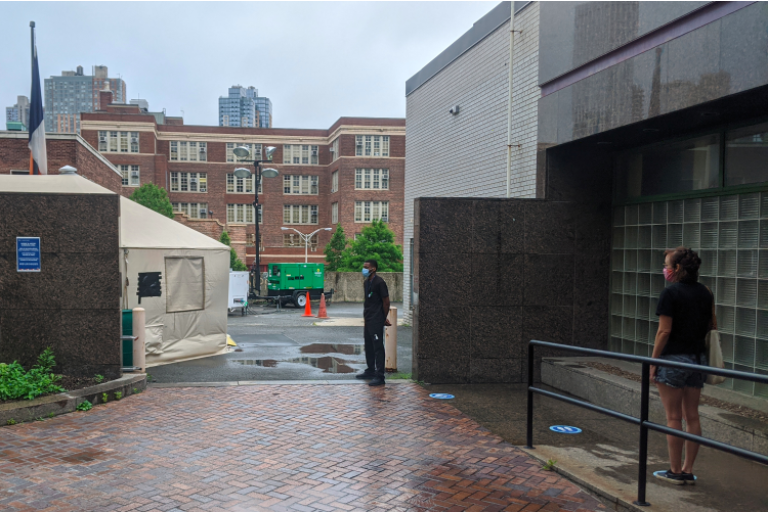City-Run COVID-19 Testing Sites Lagging in Results Turnaround


Anastassia Gliadkovskaya, originally published in THE CITY

A national surge in COVID cases has coincided with agonizing delays for New Yorkers getting tested at free sites run by the city’s public hospitals network.
Patients and staff at some NYC Health + Hospitals sites describe waits far longer than the advertised “three to five days” — a lag that increases risk of potentially exposing others to the deadly coronavirus.
Chelsea Williams-Diggs, 27, got tested at a mobile H+H unit in Bed-Stuy, Brooklyn, on July 6.
“I was told three days for results and have called twice to make sure there wasn’t an error,” she told THE CITY.
She says she was eventually told that results could take upwards of 10 days, but she was still waiting as of July 20.
One New Yorker who didn’t want his name used said he got tested at an H+H location in The Bronx on July 1 — but didn’t receive results on the system’s MyChart app until July 12.
He said he had quarantined nearly the entire time, but had to go to the grocery store when he ran out of food.
“I was hesitant to go, but needed supplies so I went because it had been so long,” the 31-year-old told THE CITY.
@NYCHealthSystem what’s the point of mass testing if it takes almost two weeks to get the results back?! It’s been 9 days and I haven’t gotten my results back!
— Jay (@pessimistbyday) July 9, 2020
At an H+H testing site in Woodside, Queens, COVID-19 test results are now taking 10 to 14 days to come back, according to an employee who spoke on the condition of anonymity.
“If you’re at the 14-day mark, the test is invalid before you even get the result,” the employee noted. “Because assuming nobody is 100% quarantining in those 14 days before receiving the result, it’s highly likely for them to be exposed and become infected.”
Telling Calls
Of eight H+H testing sites that THE CITY reached by phone July 16 four said results could take a week or longer, while two others said timing could range widely. The other two said that times ranged from two to five days.
A representative on H+H’s public COVID hotline — 1-844-NYC-4NYC — said that testing results take from four to seven business days to arrive.
Yet a spokesperson with Mayor Bill de Blasio’s office told THE CITY that “H+H is seeing shorter turnaround times than the citywide average, with tests being turned around in approximately three days on average.”
An H+H spokesperson, however, told THE CITY in an email that officials are “very conscious” of the backlogs.
Karla Griffith, the spokesperson, noted H+H is addressing the issue by “beginning to offer point-of-care testing to communities most impacted and demonstrating need” — referring to the city’s July 10 launch of a rapid testing pilot program. That’s spurred some concerns about the system’s accuracy.
H+H wholly runs about 50 testing spots that are among the Test and Trace program’s approximately 180 total locations, the rest of which are a public-private partnership, Griffith said.
Some of the H+H testing sites process samples at their own labs, she said, while others rely on already inundated providers Quest Diagnostics and BioReference Laboratories.
That can make turnaround rates wide-ranging and unpredictable.
Griffith insisted they “are currently experiencing 3-5-day turnaround for testing results at H+H testing sites,” while others sites are “averaging 7-day turnaround.”
An average of 697,000 people were tested each day nationwide last week, according to the volunteer-run COVID Tracking Project. Since July 1, about 350,000 have been tested in New York City, according to the state Department of Health.
Griffith said the city is looking to build its own lab “to process testing samples more quickly.”
Timing Is Key
The city launched its Test and Trace Corps in June, touting its ability to identify and isolate positive cases as crucial to reopening New York safely.
Widespread #COVID19 testing is key to reopening our city safely. Get tested even if you have no symptoms. Do it for your loved ones. Do it for peace of mind. Visit https://t.co/m8icdSJELf or call @nyc311 to find the testing site nearest you. #NYCTestandTrace pic.twitter.com/XXyHLNQsmq
— NYC Health + Hospitals (@NYCHealthSystem) July 14, 2020
But timing of the tests is key to their effectiveness, experts say.
It can take five to seven days for a person exposed to the coronavirus to become symptomatic or test positive, said Dr. Gabriela Andujar Vazquez, an infectious disease physician and associate hospital epidemiologist at Tufts Medical Center.
The federal Centers for Disease Control and Prevention give a range as wide as two to 14 days for symptoms to appear.
“Some patients will feel anxious about it and want to get tested right away [after feeling exposed],” she said. But before getting tested, “my recommendation to my patients would be to wait a couple of days and see if they develop symptoms.”
If a person tests negative right away, “It’s false reassurance. You think, ‘I’m out of the woods,’” Andujar Vazquez said.
On July 13, Quest announced its average turnaround time for results increased from four to six days to a week or longer, but that expedited processing continued to be available for “priority 1” hospital patients — those awaiting surgery and health care workers with symptoms.
As of July 17, a representative on the BioReference coronavirus hotline said the lab’s turnaround time was between three to five days, with the possibility — but not guarantee — of expediting certain samples.
The staffer at the Woodside H+H testing site fears the delays may be painting a distorted picture.
“At this rate, I think it’s a false sense of security,” they said.
THE CITY is an independent, nonprofit news outlet dedicated to hard-hitting reporting that serves the people of New York.




